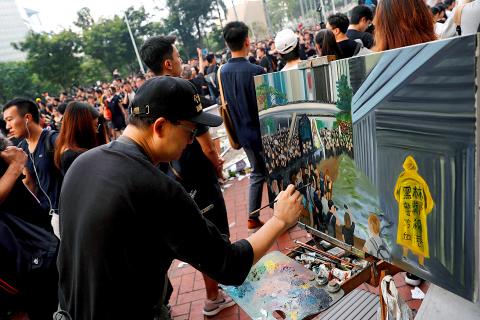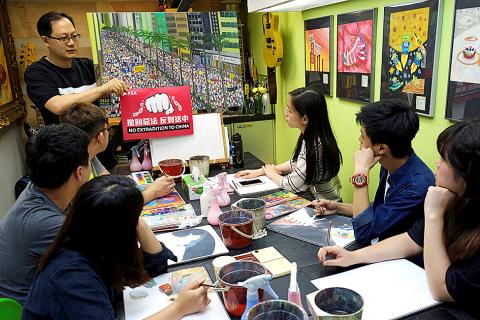For 53-year-old Perry Dino, a paintbrush and canvas are weapons for opposing the Hong Kong government as it faces mass protests against a now-suspended bill that would allow extraditions to mainland China.
Dino, who has painted many of Hong Kong’s social movements, including the pro-democracy “Umbrella movement” in 2014, considers it important to record what is happening in the Chinese-ruled city.
“I am already one of those standing on the front line to defend Hong Kong,” Dino said.

Photo: Reuters
Hong Kong’s government has indefinitely suspended the bill that would allow criminal suspects to be sent to mainland China for trial in courts controlled by the Communist Party.
However, activists — mostly students in face masks, hard-hats and goggles — are demanding the bill be fully withdrawn.
The bill has seen millions of people, fearing erosion of freedoms promised when Hong Kong returned to Chinese rule in 1997, throng the streets in protest, plunging the former British colony into political crisis.

Photo: Reuters
Braving tear gas, rubber bullets and beanbag rounds in recent weeks when protests turned violent, Dino says he has drawn and painted as much as he can about the mass rallies.
“I hope the future generation can understand what Hong Kong has gone through,” he said.
Dino, a part-time teacher, says he hopes that when Hong Kong has true democracy, he can donate his artwork to a “democracy progression museum.”
None of his artwork is currently for sale.
“Making how much money doesn’t matter to me. Only the future matters,” he said.
Among his paintings, which feature colorful brushstrokes, are ones showing demonstrators’ tents occupying major thoroughfares and a flower-etched tribute to a protester who fell to his death.
One painting depicts police firing tear gas, with thick plumes of smoke billowing across a mass of demonstrators. An abstract canvas shows activists shielding their eyes as they flee while a police officer with a rifle grins.
Since he started doing protest artwork in 2012, Dino has joined the annual June 4 Tiananmen Square vigil and made 25 paintings during the “Umbrella movement,” when protesters paralyzed parts of the financial hub for 79 days.
Dino said that during protests, Hong Kong police have told him to paint somewhere else.
In the mainland, Chinese censors strive to erase or block news or depictions of the protests.
Dino is confident he can keep doing what he is doing.
“They can’t hack into my computer and delete it like a photo, nor can they destroy it with a baton as I can always fix my painting,” he said.

Growing up in a rural, religious community in western Canada, Kyle McCarthy loved hockey, but once he came out at 19, he quit, convinced being openly gay and an active player was untenable. So the 32-year-old says he is “very surprised” by the runaway success of Heated Rivalry, a Canadian-made series about the romance between two closeted gay players in a sport that has historically made gay men feel unwelcome. Ben Baby, the 43-year-old commissioner of the Toronto Gay Hockey Association (TGHA), calls the success of the show — which has catapulted its young lead actors to stardom -- “shocking,” and says

The People’s Republic of China (PRC) invaded Vietnam in 1979, following a year of increasingly tense relations between the two states. Beijing viewed Vietnam’s close relations with Soviet Russia as a threat. One of the pretexts it used was the alleged mistreatment of the ethnic Chinese in Vietnam. Tension between the ethnic Chinese and governments in Vietnam had been ongoing for decades. The French used to play off the Vietnamese against the Chinese as a divide-and-rule strategy. The Saigon government in 1956 compelled all Vietnam-born Chinese to adopt Vietnamese citizenship. It also banned them from 11 trades they had previously

Inside an ordinary-looking townhouse on a narrow road in central Kaohsiung, Tsai A-li (蔡阿李) raised her three children alone for 15 years. As far as the children knew, their father was away working in the US. They were kept in the dark for as long as possible by their mother, for the truth was perhaps too sad and unjust for their young minds to bear. The family home of White Terror victim Ko Chi-hua (柯旗化) is now open to the public. Admission is free and it is just a short walk from the Kaohsiung train station. Walk two blocks south along Jhongshan

Snoop Dogg arrived at Intuit Dome hours before tipoff, long before most fans filled the arena and even before some players. Dressed in a gray suit and black turtleneck, a diamond-encrusted Peacock pendant resting on his chest and purple Chuck Taylor sneakers with gold laces nodding to his lifelong Los Angeles Lakers allegiance, Snoop didn’t rush. He didn’t posture. He waited for his moment to shine as an NBA analyst alongside Reggie Miller and Terry Gannon for Peacock’s recent Golden State Warriors at Los Angeles Clippers broadcast during the second half. With an AP reporter trailing him through the arena for an